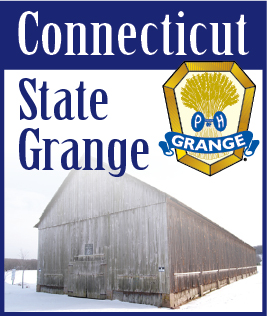| SEPTEMBER 3, 2012 -- The Farm Bill or officially “The Federal Agricultural Reform and Risk Management Act” is presently stalled in Congress. A House version was voted out of the House Agricultural Committee but it was not brought to the floor before the Legislators left for their August recess. Now it is not expected to be brought out until after the elections. Opinions are that the Democrats would like to pass it while they still control the Senate and that House Republicans want to hold off on this bill until after the election in hopes of taking back both the House and Senate.
Our National Grange Legislative Director, Grace Boatright, has been keeping us up to date on the Farm Bill with her blog. She states that despite the politics holding up the Farm Bill, the bill is more bipartisan than you would think. Frank Lucas (R-OK) and Collin Peterson (D-MN), both ranking members of the House Ag Committee have a strong friendship.
The House version highlights are saving $35 billion in mandatory finding, repealing or consolidating over 100 programs, cutting $16 billion from SNAP, and saving $6 billion by consolidating 23 programs into 13. The big problem is the Food Stamp or Supplemental Nutrition Assistance Program (SNAP) which spends close to $770 billion over the next 10 years. The House version cuts $4 billion and the Senate version looks for cuts of $16 billion.
The provisions of the 2008 Farm Bill will expire on September 30th. The House Republicans were looking for an extension to the bill but abandoned that when they could not come up with support. Instead a much narrower disaster relief program with a $383 million price tag was proposed and would only apply to 2012. This was brought up to assist drought-stricken farmers and ranchers. This program would restore the insurance program, for livestock and feed programs and add some assistance for specialty crops.
In the meantime the USDA has stepped in and taken some actions to alleviate the agony felt by farmers. They have cut the interest rates on emergency loans for farmers. Secretary Vilsack has asked crop insurers to give the farmers additional time to pay their premiums and to not charge penalties. The USDA has released thousands of CRP acres in several states for emergency grazing and haying. The drought is causing the prices of hay and grain to rise significantly costing ranchers and farmers much more for feed.
With the elections right around the corner we should be asking our legislators why they left before taking up this important bill. This year, especially with the weather related issues affecting farmers and ranchers, these crop insurance and other programs are really needed. Also remember this bill does not only affect the agricultural community but most of the “Farm Bill” is nutritional subsidies. More than 84% of the farm bill funds goes to food and nutrition programs such as food stamps, school lunches, and WIC. With the high unemployment rate we have now, these programs are in great demand. |
